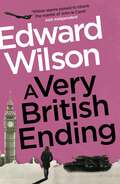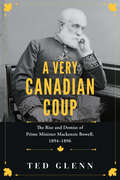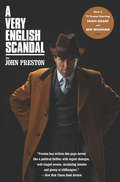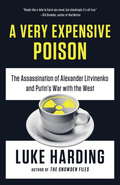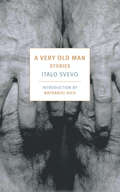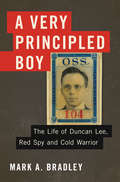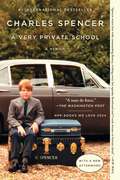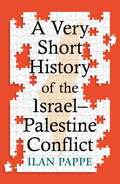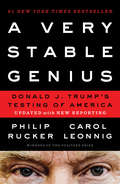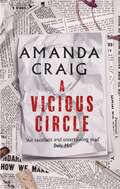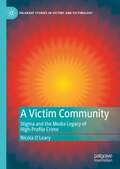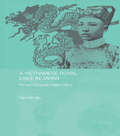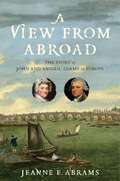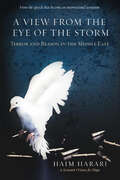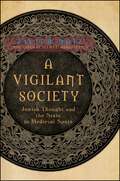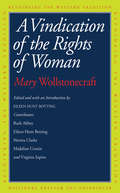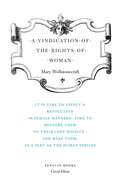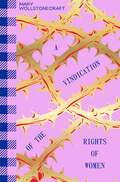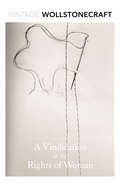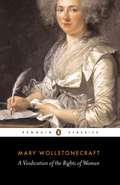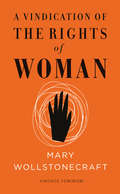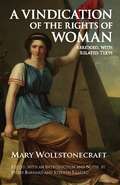- Table View
- List View
A Very British Ending (William Catesby #5)
by Edward WilsonAn MI6 officer, haunted by the ghosts of an SS atrocity, kills a Nazi war criminal in the ruins of a U-boot bunker. The German turns out to be a CIA asset being rat-lined to South America.As a hungry Britain freezes in the winter of 1947, a young cabinet minister negotiates a deal with Moscow trading Rolls-Royce jet engines for cattle fodder and wood. Both have made powerful enemies with long memories. The fates of the two men become entwined as one rises through MI6 and the other to Downing Street. It is the mid-1970s and a coup d'etat is imminent.A Very British Ending is the Wolf Hall of power games in modern Britain. Senior MI6 officers, Catesby and Bone, try to outwit a cabal of plotters trying to overthrow the Prime Minister. The author once again reveals the dark underside of the Secret State on both sides of the Atlantic.
A Very Canadian Coup: The Rise and Demise of Prime Minister Mackenzie Bowell, 1894–1896
by Ted GlennA fresh take on the Manitoba schools question and the Conservative Coup that toppled Canada’s fifth prime minister.When Mackenzie Bowell became Canada’s fifth prime minister in December 1894, everyone — including Bowell — expected the job would involve nothing more than keeping the wheels on the Conservative wagon until a spring election.Plans for a quiet caretakership were dashed in January 1895 when the courts ruled that the Manitoba government had violated Roman Catholics’ constitutional rights by abolishing the provincial separate school system. Catholics in Quebec demanded that Bowell force Manitoba to restore the schools, while Ontario Protestants warned him to keep his hands off.Backed into a corner, Bowell tried three times to negotiate a compromise with the Manitoba government over the course of 1895, but to no avail. By January 1896, seven of Bowell’s cabinet ministers had had enough. Convinced that Bowell had tarnished the Conservative brand, the caballers forced the prime minister to resign and make way for a new leader, who they believed could revive party fortunes in time for the coming election—the old Warhorse of Cumberland, Sir Charles Tupper. Ultimately, the coup didn’t matter. Tupper and his conspirators pleaded their case in Parliament and on the hustings, but nothing could stand in the way of Wilfrid Laurier and his Liberals’ historic rise to power in the June 1896 election.A Very Canadian Coup brings fresh sources and new perspectives to bear on the life and times of Canada’s fifth prime minister and his Sixth Ministry.
A Very Different Age: Americans of the Progressive Era
by Steven J. DinerThe early twentieth century was a time of technological revolution in the United States. New inventions and corporations were transforming the economic landscape, bringing a stunning array of consumer goods, millions of additional jobs, and ever more wealth. Steven J. Diner draws on the rich scholarship of recent social history to show how these changes affected Americans of all backgrounds and walks of life, and in doing so offers a striking new interpretation of a crucial epoch in our history.
A Very English Scandal: Sex, Lies, and a Murder Plot at the Heart of the Establishment
by John PrestonA behind-the-scenes look at the desperate, scandalous private life of a British MP and champion manipulator, and the history-making trial that exposed his dirty secrets As a Member of Parliament and Leader of the Liberal Party in the 1960s and 70s, Jeremy Thorpe's bad behavior snuck under the radar for years. Police and politicians alike colluded to protect one of their own. In 1970, Thorpe was the most popular and charismatic politician in the country, poised to hold the balance of power in a coalition government. But Jeremy Thorpe was a man with a secret. His homosexual affairs and harassment of past partners, along with his propensity for lying and embezzlement, only escalated as he evaded punishment. Until a dark night on the moor with an ex-lover, a dog, and a hired gun led to consequences that even his charm and power couldn't help him escape. Dubbed the "Trial of the Century," Thorpe's climactic case at the Old Bailey in London was the first time that a leading British politician had stood trial on a murder charge, and the first time that a murder plot had been hatched in the House of Commons. And it was the first time that a prominent public figure had been exposed as a philandering gay man, in an era when homosexuality had only just become legal. With the pace and drama of a thriller, A VERY ENGLISH SCANDAL is an extraordinary story of hypocrisy, deceit, and betrayal at the heart of the British Establishment.
A Very Expensive Poison: The Assassination of Alexander Litvinenko and Putin's War with the West
by Luke HardingA real-life political assassination story--complete with KGB, CIA, MI5, and Russian mobsters--that reverberates from the streets of London to the deadly halls of today's Kremlin. A Vintage Original.On November 1, 2006, journalist and Russian dissident Alexander Litvinenko was poisoned in London. He died twenty-two days later. The cause of death was Polonium--a rare, lethal, and highly radioactive substance. This is the inside story of the life and death of Litvinenko. And it is the story of the aftermath: a decade of geopolitical disruptions still felt today. In A Very Expensive Poison, Luke Harding guides readers through a maze of spies, intrigue, organized crime, and political power players to uncover the truth about Litvinenko's murder. In doing so, not only does he also become a target, but he also unearths a chain of corruption and death leading straight to Vladimir Putin, which sheds terrifying light on Russia's secret war with the West.
A Very Old Man: Stories
by Italo SvevoA newly translated collection of fiction by the influential Italian modernist, continuing on his landmark work Zeno's Conscience.A Very Old Man collects five linked stories, parts of an unfinished novel that the great Triestine Italo Svevo wrote at the end of his life, after the international success of Zeno&’s Conscience in 1923. Here Svevo revisits with new vigor and agility themes that fascinated him from the start—aging, deceit, and self-deception, as well as the fragility, fecklessness, and plain foolishness of the bourgeois paterfamilias—even as memories of the recent, terrible slaughter of World War I and the contemporary rise of Italian fascism also cast a shadow over the book&’s pages. It opens with &“The Contract,&” in which Zeno&’s manager, the hardheaded young Olivi, expresses, like the war veterans who were Mussolini&’s early followers, a sense of entitlement born of fighting in the trenches. Zeno, by contrast, embodies the confusion and paralysis of the more decorous, although sleepy, way of life associated with the onetime Austro-Hungarian Empire which for so long ruled over Trieste but has now been swept away. As always, Svevo is attracted to the theme of how people fail to fit in. It is they, he suggests, who offer a recognizably human countenance in a world ravaged by the ambitions and fantasies of its true believers.
A Very Principled Boy: The Life of Duncan Lee, Red Spy and Cold Warrior
by Mark A. BradleyDuncan Chaplain Lee was an unlikely traitor. A Rhodes Scholar, patriot, and descendent of one of America’s most distinguished families, he was also a communist sympathizer who used his position as aid to intelligence chief #147;Wild Bill” Donovan to leak critical information to the Soviets during World War II. As intelligence expert Mark A. Bradley reveals, Lee was one of Stalin’s most valuable moles in U. S. intelligence, passing the KGB vital information on everything from the D-Day invasion to America’s plans for postwar Europe. Outwitting both J. Edgar Hoover and Senator Joseph McCarthy, he escaped detection again and again, dying a free man before authorities could prove his guilt. A fast-paced cat-and-mouse tale of misguided idealism and high treason, Perry's book draws on thousands of previously unreleased CIA and State Department records to reveal the riveting story of one of the greatest traitors of the twentieth century.
A Very Private School: A Memoir
by Charles SpencerINTERNATIONAL BESTSELLER | NPR &“BOOKS WE LOVE&” 2024 | PEOPLE&’S &“BEST CELEBRITY MEMOIRS&” 2024 | TOWN & COUNTRY&’S &“BEST NEW ROYAL BOOKS&” 2024 | THE TIMES (LONDON) &“10 BEST BIOGRAPHIES AND MEMOIRS&” 2024 | WINNIPEG FREE PRESS&’S &“BEST BOOKS&” 2024 &“A tour de force.&” —The Washington Post In this poignant memoir, Charles Spencer recounts the trauma of being sent away from home at age eight to attend boarding school.A Very Private School offers a clear-eyed, first-hand account of a culture of cruelty at the school Charles Spencer attended in his youth and provides important insights into an antiquated boarding system. Drawing on the memories of many of his schoolboy contemporaries, as well as his own letters and diaries from the time, he reflects on the hopelessness and abandonment he felt at aged eight, viscerally describing the intense pain of homesickness and the appalling inescapability of it all. Exploring the long-lasting impact of his experiences, Spencer presents a candid reckoning with his past and a reclamation of his childhood.
A Very Short History of the Israel–Palestine Conflict
by Ilan PappeAn indispensable guide to understanding the Israel–Palestine conflict, and how we might yet still find a way out of it. 'Ilan Pappe is the most original, radical and hard-hitting of Israel&’s "new historians".' Avi Shlaim, author of Three Worlds The devastation of 7 October 2023 and the horrors that followed astounded the world. But the Israel–Palestine conflict didn&’t start on 7 October. It didn&’t start in 1967 either, when Israel occupied the West Bank, or in 1948 when the state of Israel was declared. It started in 1882, when the first Zionist settlers arrived in what was then Ottoman Palestine. Ilan Pappe untangles the history of two peoples, now sharing one land. Going back to the founding fathers of Zionism, Pappe expertly takes us through the twists and turns of international policy towards Israel–Palestine, Palestinian resistance to occupation, and the changes taking place in Israel itself.
A Very Stable Genius: Donald J. Trump's Testing of America
by Philip Rucker Carol LeonnigWashington Post national investigative reporter Carol Leonnig and White House bureau chief Philip Rucker, both Pulitzer Prize winners, provide the definitive insider narrative of Donald Trump's unique presidency with shocking new reporting and insight into its implications. <P><P>“I alone can fix it.” So went Donald J. Trump’s march to the presidency on July 21, 2016, when he accepted the Republican presidential nomination in Cleveland, promising to restore what he described as a fallen nation. Yet over the subsequent years, as he has undertaken the actual work of the commander in chief, it has been hard to see beyond the daily chaos of scandal, investigation, and constant bluster. It would be all too easy to mistake Trump’s first term for one of pure and uninhibited chaos, but there were patterns to his behavior and that of his associates. <P><P>The universal value of the Trump administration is loyalty - not to the country, but to the president himself - and Trump’s North Star has been the perpetuation of his own power, even when it meant imperiling our shaky and mistrustful democracy. Leonnig and Rucker, with deep and unmatched sources throughout Washington, D.C., tell of rages and frenzies but also moments of courage and perseverance. <P><P>Relying on scores of exclusive new interviews with some of the most senior members of the Trump administration and other firsthand witnesses, the authors reveal the forty-fifth president up close, taking readers inside Robert Mueller’s Russia investigation as well as the president’s own haphazard but ultimately successful legal defense. Here for the first time certain officials who have felt honor-bound not to publicly criticize a sitting president or to divulge what they witnessed in a position of trust tell the truth for the benefit of history. <P><P>This peerless and gripping narrative reveals President Trump at his most unvarnished and exposes how decision making in his administration has been driven by a reflexive logic of self-preservation and self-aggrandizement - but a logic nonetheless. This is the story of how an unparalleled president has scrambled to survive and tested the strength of America’s democracy and its common heart as a nation. <p><b>A New York Times Bestseller</b>
A Vicious Circle: ‘A rip-roaring read' Elle
by Amanda Craig'A love story and political comment, a defence of the art of fiction, a masterpiece' Evening Standard'An excellent and entertaining read' Daily Mail'Rich and splendid...viciously funny and a rip-roaring read' ElleA Vicious Circle exposes the corruption of London's journalistic circuit, the horrors of our hospitals and slums, and the transformations caused by motherhood. Gripping, tender and fiercely funny, it has been instantly recognised as a modern classic about the way we live now.
A Victim Community: Stigma and the Media Legacy of High-Profile Crime (Palgrave Studies in Victims and Victimology)
by Nicola O’LearyAlthough historically ignored, crime victims are now very firmly on the map. For politicians, newspapers, the media and the public at large, criminal injury and loss are a source of constant concern and anxiety. Criminologists and media analysts have studied much of this concern in recent years but what has not been investigated is how communities experience high profile crimes and the media intrusion that inevitably follows. This book seeks to address this gap by exploring how the communities of Soham and Dunblane, that witnessed high profile crimes, lived with the tragic events at the time and the attention of the world’s media afterwards.Based on a two-year qualitative study of these communities, this book looks beneath the surface of the relationships, dilemmas and unexpected triumphs of communities struggling to come to terms with the most harrowing of events, within the glare of the media spotlight. Combining empirical observations with media analysis and social theory, this book offers something new to the criminological audience: the concept of the victim community.
A Vietnamese Royal Exile in Japan: Prince Cuong De (1882-1951) (Routledge Studies in the Modern History of Asia)
by Tran My-VanPrince Cuong De, viewed by the French as a pretender to the Vietnamese throne, was an important and interesting figure in the history of Vietnam’s struggle for independence. He was highly regarded by many non-communist Vietnamese nationalists, but has been virtually ‘written out’ of Vietnamese history. Based on extensive original research, including interviews and important documents from the French national archives, this book traces the life of Cuong De as a royal exile in Japan, exploring his links to key Japanese leaders and how he campaigned for his cause and was supported in Japan, Vietnam and elsewhere. The author shows how Cuong De had great hopes that imperial Japan would advance the cause of Vietnamese independence from France, especially during the Japanese occupation of Vietnam in 1941-5. But these hopes were disappointed as Japan's Indochina policy gave primacy to Japan's own economic and strategic self-interest. This book provides many fascinating insights into the development of Vietnamese nationalism and the long, harsh struggle for independence, from the perspective of an interesting and undeservedly neglected figure.
A View from Abroad: The Story of John and Abigail Adams in Europe
by Jeanne E. AbramsReveals how the European travels of John and Abigail Adams helped define what it meant to be an AmericanFrom 1778 to 1788, the Founding Father and later President John Adams lived in Europe as a diplomat. Joined by his wife, Abigail, in 1784, the two shared rich encounters with famous heads of the European royal courts, including the ill-fated King Louis XVI and Queen Marie-Antoinette, and the staid British Monarchs King George III and Queen Charlotte. In this engaging narrative, A View from Abroad takes us on the first full exploration of the Adams’s lives abroad. Jeanne E. Abrams reveals how the journeys of John and Abigail Adams not only changed the course of their intellectual, political, and cultural development—transforming the couple from provincials to sophisticated world travelers—but most importantly served to strengthen their loyalty to America.Abrams shines a new light on how the Adamses and their American contemporaries set about supplanting their British origins with a new American identity. They and their fellow Americans grappled with how to reorder their society as the new nation took its place in the international transatlantic world. After just a short time abroad, Abigail maintained that, “My Heart and Soul is more American than ever. We are a family by ourselves.” The Adamses’ quest to define what it means to be an American, and the answers they discovered in their time abroad, still resonate with us to this day.
A View from the Eye of the Storm: Terror and Reason in the Middle East
by Haim HarariIn 2004, internationally known physicist Haim Harari was invited to address the advisory board of a major multinational corporation. In a short speech he offered a penetrating analysis of the components of terror, and presented a passionate call for a new era in the Middle East. The speech, entitled "A View from the Eye of the Storm," was not intended for publication, but when a copy was leaked and posted onto the Internet, it caused a worldwide sensation, eventually being translated into more than half a dozen languages. Now—as the modern era of Islamic terror continues to unfold—Harari reaches further, to offer this serious yet accessible survey of the landscape of Middle Eastern war and peace at this challenging crossroads in history.Moving beyond the sterile discourse of foreign affairs journals, Harari encourages the world to view the Middle East through the eyes of a "proverbial taxi driver," a man on the street whose wisdom (and sense of humor) outstrips that of the experts. And, as he observes, to anyone familiar with the Middle East from a taxi driver's perspective, the "persistent ugly storm" engulfing the Arab world is far more than a territorial battle with Israel: It is an "undeclared World War III" that rages from Bali to Madrid, from Nairobi to New York, from Buenos Aires to Istanbul, and from Tunis to Moscow. The sad result is that much of the Arab world has become an "unprecedented breeding ground for cruel dictators, terror networks, fanaticism, incitement, suicide murders, and general decline." And unless the free nations of the world mobilize to stop it, Harari argues, this new world war will continue to cause bloodshed on all continents.As a fifth-generation Israeli-born observer, Harari includes a thorough response to the conventional wisdom about Middle Eastern affairs, including a frank dissection of the media's lopsided portrait of the Arab-Israeli conflict. Drawing on his family's two centuries of life in the Middle East, he offers a compelling catalog of the steps necessary to reach a lasting peace between Israel and the Palestinians—steps, he writes, that are "inevitable—not because everybody accepts them today, but because all sides must accept them before peace can be achieved." And he urges the civilized world to combat terror by isolating its state sponsors, blocking its funding, and promoting education, women's equality, and human rights reform.Eloquent in its simplicity, written with passion, humor, and the directness of a scientist who has spent a lifetime explaining his work to the general public, A View from the Eye of the Storm is that rare book with the power to change hearts and minds.
A View from the Stands
by John Kenneth GalbraithIn the decades since World War II, no American writer has done more to comfort the afflicted and afflict the comfortable than John Kenneth Galbraith. Galbraith reflects on many famous people, including Mencken, Hemingway, O'Hara, Muggeridge, Buckley, and more.
A View of the State of Ireland
by Andrew Hadfield Willy Maley Edmund SpenserA translation which maintains much of the spelling of the time.
A Vigilant Society: Jewish Thought and the State in Medieval Spain
by Javier RoizA Vigilant Society presents a provocative hypothesis that argues that Western society as we know it emerged from the soil of Jewish intellectual advances in the thirteenth century, especially those formulated on the Iberian Peninsula. A paradigmatic shift began to occur, one that abandoned the pre–Gothic Sephardic wisdom found in, for example, the writings of Maimonides in favor of what author Javier Roiz calls the "vigilant society." This model embraces a conception of politics that includes a radical privatization of an individual's interior life and—especially as adopted and adapted in later centuries by Roman Catholic and Calvinist thinkers—is marked by a style of politics that accepts the dominance of power and control as given. Vigilant society laid the foundation for the Western understanding of politics and its institutions and remains pervasive in today's world.
A Vindication of the Rights of Woman
by Mary Wollstonecraft Eileen Hunt BottingMary Wollstonecraft's visionary treatise, originally published in 1792, was the first book to present women's rights as an issue of universal human rights. Ideal for coursework and classroom study, this comprehensive edition of Wollstonecraft's heartfelt feminist argument includes illuminating essays by leading scholars that highlight the author's significant contributions to modern political philosophy, making a powerful case for her as one of the most substantive political thinkers of the Enlightenment era. No other scholarly work to date has examined as closely both the ideological moorings and the enduring legacy of Wollstonecraft's groundbreaking and courageous discourse.
A Vindication of the Rights of Woman
by Mary WollstonecraftFirst published in 1792, A Vindication of the Rights of Woman was an instant success, turning its thirty-three-year-old author into a minor celebrity. A pioneering work of early feminism that extends to women the Enlightenment principle of "the rights of man," its argument remains as relevant today as it was for Woll-stonecraft's contemporaries. "Mary Wollstonecraft was not the first writer to call for women to receive a real, challenging education," writes Katha Pollitt in the new Introduction. "But she was the first to connect the education of women to the transformation of women's social position, of relations between the sexes, and even of society itself. She was the first to argue that women's intellectual equality would and should have actual consequences. The winds of change sweep through her pages." This classic work of early feminism remains as relevant and passionate today as it was for Wollstonecraft's contemporaries. This edition includes new explanatory notes.From the Trade Paperback edition.
A Vindication of the Rights of Woman (Cambridge Texts In The History Of Political Thought Ser.)
by Mary WollstonecraftA seminal book in a feminist conversation that still continues today.Now regarded as one of the founding feminist philosophers, Mary Wollstonecraft's writings have inspired conversation and action since their first publication. Wollstonecraft produced this declaration of female independence in 1792. Passionate, eloquent and forthright, it launched a scathing attack on the current understanding of women and laid out the tenets for a new vision: equal education, an end to prejudice and a chance for women to become defined by their profession, not their partner. Whereas Mary Wollstonecraft's work was received at the time with a mixture of admiration and outrage, she is now rightly viewed as a powerful matriarch of modern feminism.Part of a boldly designed series of classics, with wider margins for notes, this book is perfect for design-lovers and students alike. With bold, eye-catching graphic covers by Evi O Studio, this collection aims to introduce a selection of the most celebrated works of the last thousand years to a new audience. Featuring tales of adventure, fiction from the 19th and 20th centuries, feminist writings, and reflections on art, politics, philosophy and the origins of man, this is a small, wide-reaching and essential collection.'My own sex, I hope, will excuse me, if I treat them like rational creatures.'
A Vindication of the Rights of Woman (Cambridge Texts In The History Of Political Thought Ser.)
by Mary WollstonecraftA key work of proto-feminism, Mary Wollstonecraft's readable and impassioned argument is as relevant today as it was two hundred years ago. Before the concept of equality between the sexes was even conceived, Wollstonecraft wrote this book, a treatise of proto-feminism that was as powerful and original then as it is now. In it she argues with clarity and originality for the rational education of women and for an increased female contribution to society. It was a cry for justice from a woman with no power other than her pen and it put in motion a drive towards greater equality between men and women, a movement which continues to this day. ‘The first great piece of feminist writing’ Independent
A Vindication of the Rights of Woman (Cambridge Texts In The History Of Political Thought Ser.)
by Mary Wollstonecraft'She is alive and active - we hear her voice and trace her influence even now' Virginia WoolfWriting in an age when the call for the rights of man had brought revolution to America and France, Mary Wollstonecraft produced her own declaration of female independence in 1792. Passionate and forthright, A Vindication of the Rights of Woman attacked the prevailing view of docile, decorative femininity, and instead laid out the principles of emancipation: an equal education for girls and boys, an end to prejudice, and for women to become defined by their profession, not their partner. Mary Wollstonecraft's work was received with a mixture of admiration and outrage - one critic called her 'a hyena in petticoats' - yet it established her as the mother of modern feminism.
A Vindication of the Rights of Woman (Vintage Feminism Short Editions)
by Mary WollstonecraftDiscover Wollstonecraft’s classic feminist text in an abridged, digestible form.WITH AN INTRODUCTION BY ZOE WILLIAMS The term feminism did not yet exist when Mary Wollstonecraft wrote this book, but it was the first great piece of feminist writing. In these pages you will find the essence of her argument – for the education of women and for an increased female contribution to society. Her work made the first ripples of what would later become the tidal wave of the women’s rights movement. Rationalist but revolutionary, Wollstonecraft changed the world for women.Vintage Feminism: classic feminist texts in short form
A Vindication of the Rights of Woman: Abridged, with Related Texts
by Mary Wollstonecraft Stephen Shapiro Philip BarnardThis edition features a shrewd, annotated abridgment of Mary Wollstonecraft's A Vindication of the Rights of Woman (1792) accompanied by an array of texts that help situate the Vindication in its political, historical, and intellectual contexts. Included are key selections from Wollstonecraft's other writings; from closely related works by Burke, Paine, Godwin, Rousseau, Macaulay, Talleyrand, and Brockden Brown; and from the 1789 Declaration of the Rights of Man and Citizen and de Gouges' Declaration of the Rights of Woman and Female Citizen (1791).
